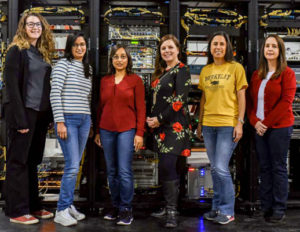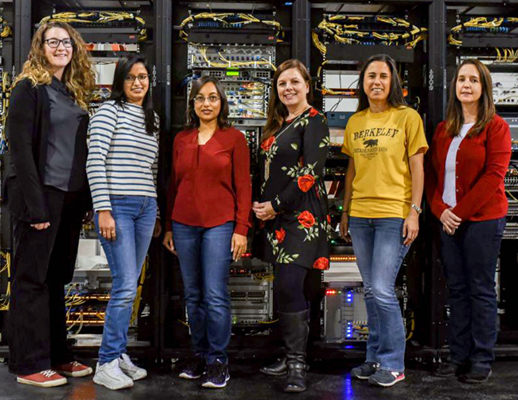In this special guest feature, Alisa Alering from ScienceNode writes that a team of women engineers helped build SCinet as part of the WINS program at SC17.
 Each year a very-high capacity temporary network is designed and built solely to serve the world’s largest conference of all things supercomputing: SC.
Each year a very-high capacity temporary network is designed and built solely to serve the world’s largest conference of all things supercomputing: SC.
Planned more than a year in advance, the SCinet conference network is built entirely from scratch in the two weeks leading up to the conference. When the convention center doors open, the world’s fastest and most powerful network is up and running, ready to support the latest in advanced computing applications and demonstrations.
To the conference’s more than 12,000 attendees, it may seem as if the network to which they seamlessly connect was built by an unseen army of technological elves, but it’s actually a team of over 100 volunteer experts.
The installation experience is intense, but as the volunteers rise to the challenge, they also learn valuable technical skills and form professional relationships that last throughout their careers.
Which is why it’s important that the SCinet team reflect the diversity we’d like to see in the profession at large, says Marla Meehl, Head of Networking Engineering and Telecommunications at the University Corporation for Atmospheric Research (UCAR), the Principle Investigator (PI) of the National Science Foundation (NSF) Women in IT Networking at SC (WINS), and co-chair of the Internet2 Inclusivity Initiative (I2I).

Along with NSF Co-PI Wendy Huntoon of KINBER, Kate Petersen Mace, Lauren Rotman, and Jason Zurawski of ESnet, Meehl developed the program in 2015 to give women increased exposure to this invaluable experience.
“WINS is one concrete, practical way of addressing the gender gap that exists in IT, especially in network engineering and HPC,” says Meehl.
With the support of a grant from the NSF and the US Department of Energy (DOE), WINS awardees receive full travel support and mentoring by engineering experts.
In addition to the technical skills gained during the SCinet experience, Meehl emphasizes the importance of the other kind of networking experience: person-to-person.
“It’s more common for men to have a professional network of people they can reach out to,” says Meehl. “That’s a little harder for women to build, just because there aren’t as many of us in the field.”
The 2017 participants agree wholeheartedly.
Working with and getting to know individuals who share the same technical interests from different organizations all around the world was simply amazing,” says 2017 awardee Renuka Arya, of the University of Chicago.
Hard work and big rewards
The women who join SCinet participate on one of fifteen teams, each focused on a specific area of expertise in operating a research network (e.g., installing fiber optic network connections, managing internet routing protocols, configuring WAN connections, cybersecurity, etc.)

Awardees participate in all aspects of the network, including set-up, maintenance, and tear-down. Each woman is assigned to a mentor to help guide her through the SCinet process the first year.
This apprenticeship opportunity gives these early to mid-career women direct access to cutting-edge network hardware and software, leading engineers, and vendors.
The six women chosen to build SCinet at SC17 in Denver, Colorado hail from around the country. Meehl is particularly proud of the inclusion of women from smaller universities, such as South Dakota State and Western State Colorado University.
“A lot of these women come from small schools, and they may not normally get exposed to the technology SCinet provides,” says Meehl. “It’s a great experience technically, but they also get a great professional experience meeting people—that really brings value to your ability to do your job.”
Dori Sajdak, a senior systems administrator at The University at Buffalo says, “I thought I had an idea about the amount of work that went into building and running SCinet, but I really didn’t! It’s an enormous task with so many moving parts.”
But everyone Sajdak worked with was more than willing to give advice and pointers, she says. “No one was in it for personal gain, it was the epitome of team work.”
For Soledad Toledano of Lawrence Berkeley National Laboratory (LBNL), the experience surprised her—in a good way.
Working on SCinet meant a proof to myself that I can do the work ~ Soledad Toledano (LBNL)
“I didn’t expect the environment to be so relaxed, welcoming, and mentoring for women,” says Toledano. “I think some of us may have a very different experience in our daily work environments—it should be like SC all the time, but unfortunately, there is still a long way to go.”
The rewards of the WINS program are not limited to the participants. Their home organizations also benefit, as the awardees return home with new knowledge, more confidence, and new ideas they want to pursue.
The hands-on experience has definitely boosted my confidence to try new vendors, features, and technologies in my home institution,” says Arya.
Tania Jareen, a network engineer at Purdue University, says, “The WINS program provides a unique opportunity to learn, build, operate and fix the fastest network within a short time. A great collaborative group of people is the crucial key to innovation in today’s world.”
The grant has one more year of funding to send women to build SCinet at SC18 in Dallas in November of this year. Applications will open in early March.
We’ve got a lot of pieces of the gender diversity problem to work on, and WINS is just a tiny piece,” says Meehl. “But in the three years I’ve been doing this, it’s been amazing to see just how much more aware people in the community have become.”
WINS is a joint effort between the Energy Sciences Network (ESnet), the Keystone Initiative for Network Based Education and Research (KINBER), the University Corporation for Atmospheric Research (UCAR) and SCinet.
This story was originally published on ScienceNode under the Creative Commons license.




